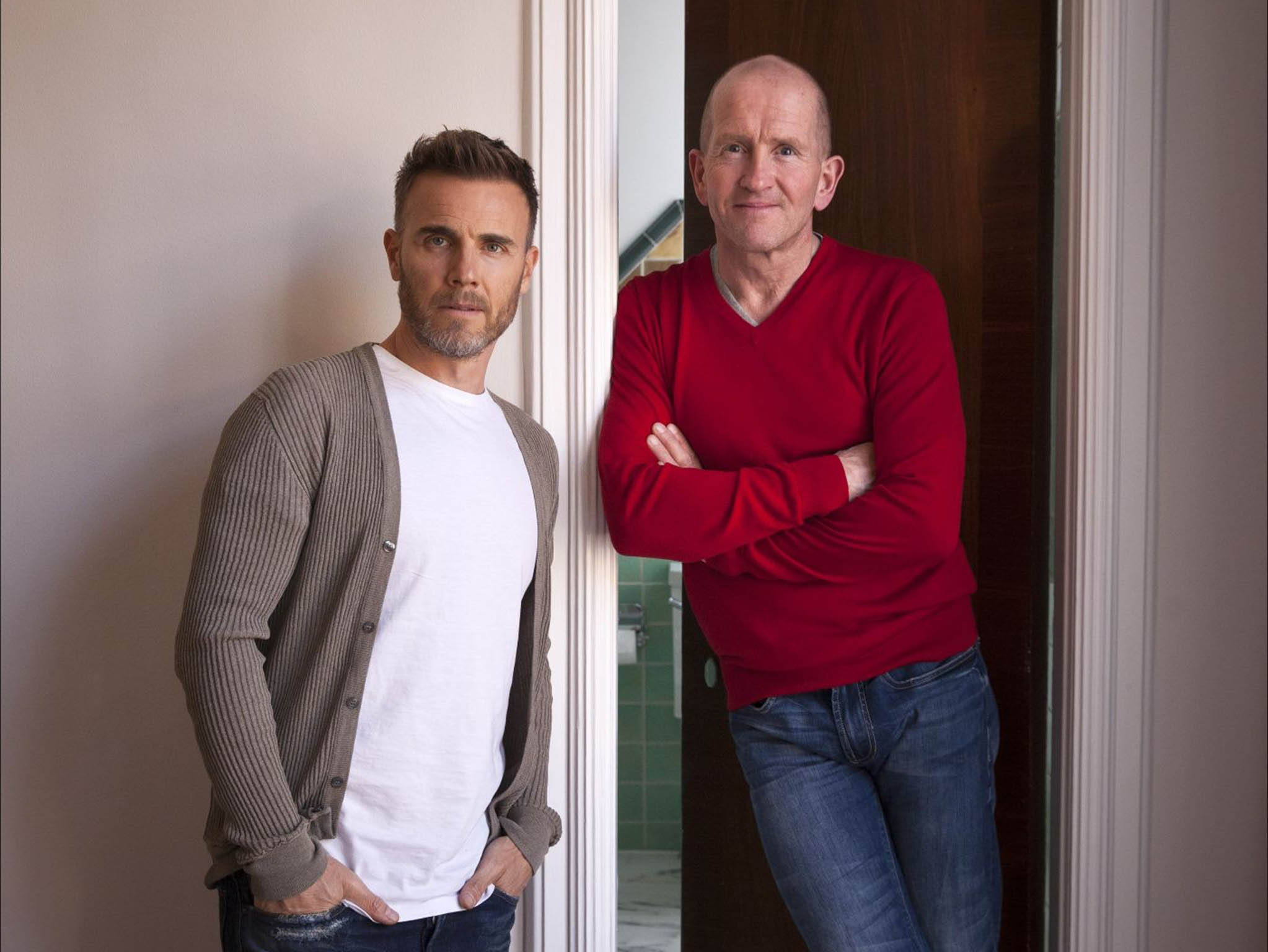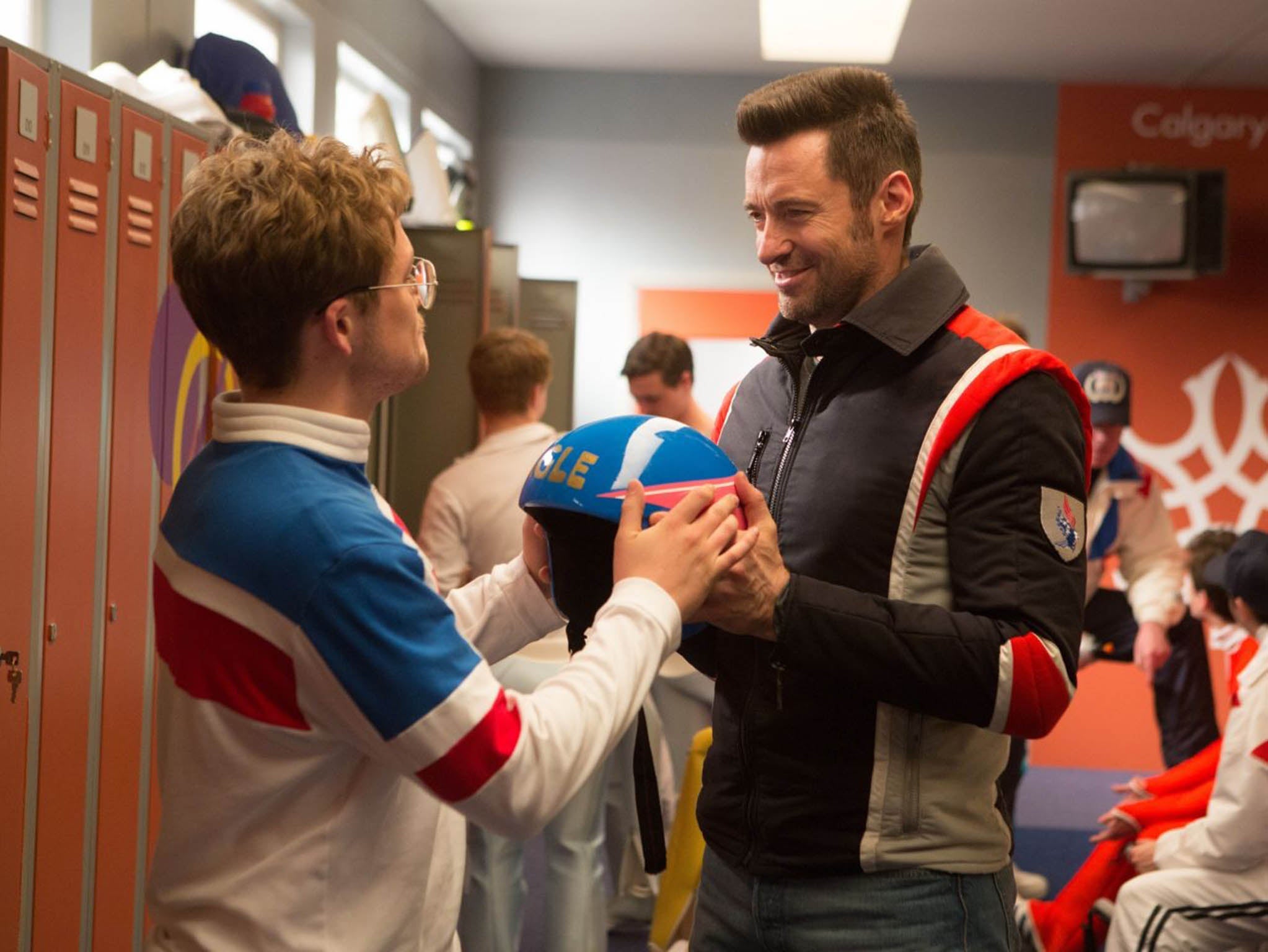Gary Barlow on meeting Eddie the Eagle and collaborating on the new film
Gary Barlow, who created ‘Fly’ – an imaginary Eighties soundtrack for the ‘Eddie the Eagle’ biopic – meets the film’s subject for the first time

There is a moment in the new Eddie the Eagle film, says Gary Barlow, who produced the soundtrack, where the man portrayed as so poorly coordinated you wouldn’t fancy his chances walking to the shops, much less competing at the Winter Olympics, overcomes his multiple handicaps through sheer chutzpah so as to seem utterly heroic, a Muhammad Ali with underbite. It was 1988 in Calgary, and Edwards was about to take the leap of his life.
“I remember being called in from the garden to watch on TV,” Barlow says. “Everyone was rooting for him, the whole country.”
Edwards, from unsnowy Gloucester, had arrived late to downhill skiing. He was 25. Where it takes the world’s best ski jumpers up to 20 years before they are proficient at the 90-metre jump, it took him just 20 months. But what he lacked in skill, he made up for with blind determination.
The jump should have critically injured him – it has others – but Edwards made it, upright and intact, setting a personal best and a British record, much to everyone’s delight. When you watch this moment recreated on screen, it is difficult not to jump from your seat hollering at the sheer bloody wonder of it all. “It was an unbelievable achievement,” Barlow says.
The film, directed by Dexter Fletcher and starring Taron Egerton (as Eddie), last seen as a pseudo-James Bond in Kingsman, has already been an unexpected success in America, where it is being hailed as this year’s The Full Monty.
This means that, in its slipstream, Edwards has re-entered the spotlight once more, which is why he is at Claridges today to promote it, alongside the film’s cast. But while Egerton and Hugh Jackman (who plays Edwards’ alcoholic trainer) face the world’s TV media, Edwards sits a little off from the main action, down a thickly carpeted corridor and in a suite that smells of lavender, to talk to me and to meet, for the first time, Barlow, who has spent the past 12 months immersed in all things Eddie Edwards, and arguably knows his story better than the man himself.
Barlow arrives moments later, trim in a white T-shirt and skinny jeans. The pair shake hands warmly. “So nice to meet you!” Edwards says.
For the soundtrack, Barlow elected not simply to dig up a selection of classic Eighties tracks but rather the artists themselves, and to collaborate on new songs with them.
He spent a year tracking down some of his favourite acts of the era. “I wanted the legendary voices of that decade, the kind of voices that as soon as you hear them, you feel like you’re 15 again.” He researched many of them – Kim Wilde, Go West, ABC, Paul Young – on YouTube, keen to view current footage to ensure, he says, “that they could still sing, and sound great. And they could. And they are all still really prolific, still touring.”

Watch Apple TV+ free for 7 day
New subscribers only. £9.99/mo. after free trial. Plan auto-renews until cancelled.
ADVERTISEMENT. If you sign up to this service we will earn commission. This revenue helps to fund journalism across The Independent.

Watch Apple TV+ free for 7 day
New subscribers only. £9.99/mo. after free trial. Plan auto-renews until cancelled.
ADVERTISEMENT. If you sign up to this service we will earn commission. This revenue helps to fund journalism across The Independent.
The album, entitled Fly, was recorded on equipment dating from the era, and each artist clearly took the film’s thematic brief seriously, which might explain the somewhat literal quality of many of the tracks here: “Ascension” by Holly Johnson, “Eagle Will Fly Again” by Howard Jones, “The Sky’s The Limit” by Nik Kershaw.
I ask Edwards what it’s like being the subject of a concept album. “I don’t know! I haven’t heard it yet!” he bellows. “I’ll get you a copy,” Barlow assures him.
For the next 45 minutes, Barlow essentially plays host in his very own chat show, Edwards the eager guest, happy to talk, happier still to have someone listen.
The songwriter is more Terry Wogan than Michael Parkinson, convivial and empathetic, right leg crossed over left. He tells him he loves the film, and is in awe of Edwards’ reckless bravery. He wants to know how he ever found the courage to jump in the first place. “I just did it,” Edwards says, shrugging. “I didn’t really think about it too much. That’s the secret, I think.”

Barlow nods. “That’s youth,” he says. “When I first went on stage at 17, 18, it never used to bother me. You don’t think about people watching you, do you? You’re just completely focused.”
“Oh, I couldn’t think about the people watching me,” Edwards says. “There were 89,000 in the crowd, millions on TV. The thought would have terrified me!”
Barlow asks him how he took to fame and its attendant pressures. “What was it like?” he asks. “Did you enjoy it?”
“I remember landing back in London after the Games and waiting for my bags. When about 30 policemen came up to me. I just thought, ‘What have I done? Have they found drugs?’
But they told me they were here just to help me through the airport because about 15,000 people were waiting outside for me. It was all very surreal. But that only lasted 18 months, two years tops.” Edwards shrugs. “Thing is, I never looked for fame in the first place.”
“Same here,” Barlow says. “It’s just a byproduct, isn’t it? Something that comes along with the thing you love to do most.”
Shortly after Edwards returned home from the Games, the rules of qualification were changed, thus ending his career at a stroke. “The authorities never liked me,” he says. “They thought I was making a mockery of the sport, bringing it into disrepute. They didn’t like the fact that somebody ranked 58th in the world should get more attention than the person winning gold.”
Unable now to compete, at least professionally, Edwards was promptly relegated to D-list celebrity status, in perpetual search of after-dinner speech bookings. He got divorced, and at one point was declared bankrupt.
Barlow’s fame had faltered, too. After Take That split in the mid-1990s, his solo career failed to take off. A period of self-loathing ensued. “I was embarrassed to be me,” he said, back in 2011. Now that he is successful again, I ask whether he has grown tired of fame, of constant recognition?
“Actually, no,” he says. “I did in the 90s, but I was younger then, and I thought it was going to last forever, which of course it doesn’t. You’ve got to get out of the house to do something for that success to continue, and as I’ve got older, I appreciate it now more than ever.”
Beside him, Edwards nods. Media jobs – which is to say, high-paying jobs – have been in short supply for the former Olympian. He earns his crust as a builder and plasterer. “I was plastering a wall in a kitchen in Gloucester just two weeks ago.”
Barlow, ever avuncular, pats him on the arm. “I don’t think you’ll have to do too much plastering for the rest of this year,” he says.
At this, Edwards beams. “Oh, I hope not.”
‘Fly’ is out now. ‘Eddie the Eagle’ is in cinemas on 1 April
Join our commenting forum
Join thought-provoking conversations, follow other Independent readers and see their replies
Comments
Bookmark popover
Removed from bookmarks